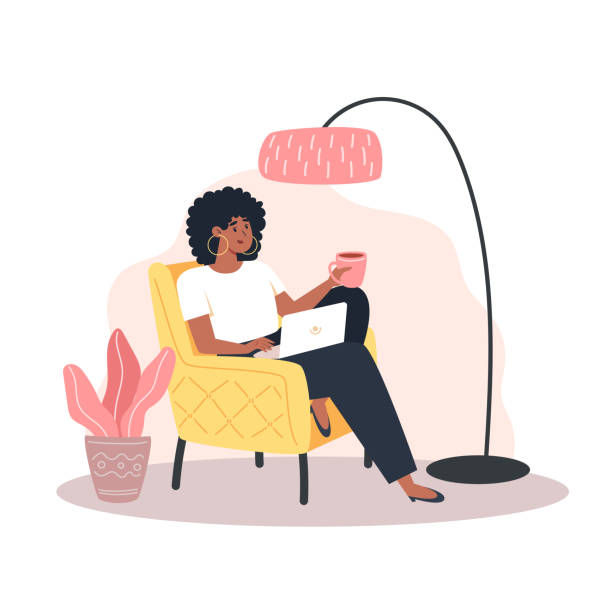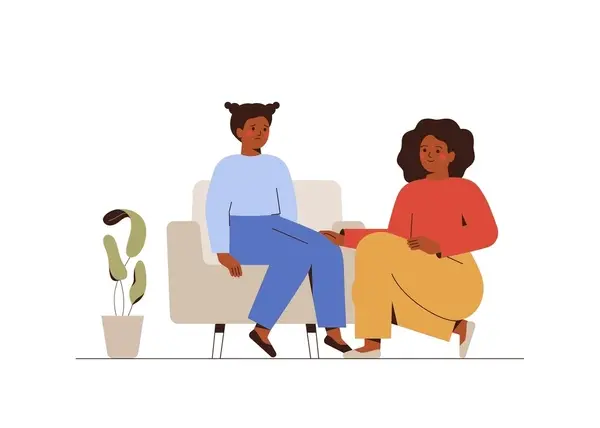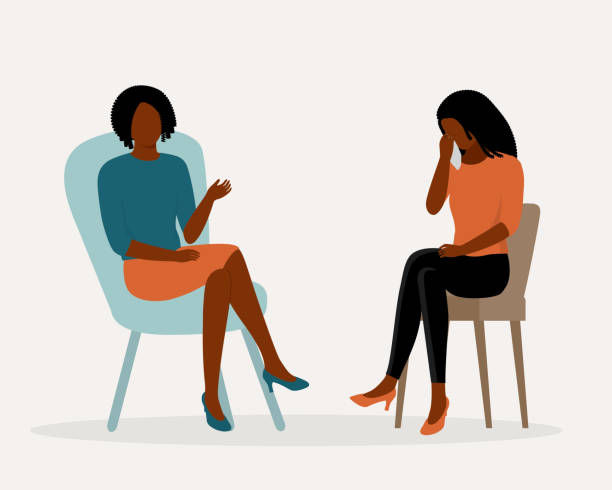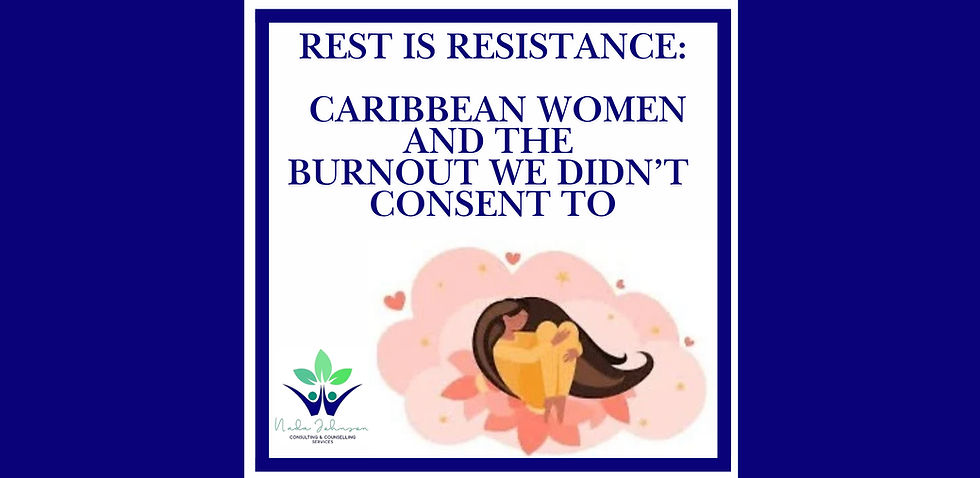🔒 Silenced for Generations: Breaking Caribbean Family Secrets and the Mental Health Toll
- Nada Johnson

- Jun 30, 2025
- 5 min read
Exploring the legacy of secrecy, shame, and unspoken trauma and how NJCCS helps Caribbean women heal in truth.

🤐 “What Happens in This House…”
Many Caribbean women grow up under the weight of an unspoken rule:
“What happens in this house, stays in this house.”
From sexual abuse to emotional neglect, family trauma is often buried beneath silence, spiritualization, or denial (Phillips & Weekes, 2021). The cultural norm of secrecy rooted in colonial survival tactics and patriarchal control prevents emotional disclosure and perpetuates cycles of harm (Crawford-Brown & Rattray, 2015).
This silence is not harmless. Studies show that family secrecy leads to increased anxiety, depression, and shame, especially in Black and Caribbean communities where vulnerability is often stigmatized (Boyd-Franklin, 2003; Greene, 2006). Secrets become generational ghosts, haunting daughters and granddaughters with untold stories and unexplained pain.

🧠 The Mental Health Consequences of Family Secrets
Unspoken trauma doesn’t disappear it festers. Caribbean women raised in families where abuse or dysfunction was normalized often internalize guilt, self-blame, and mistrust of others (Daniel, 2018). Psychological research links this to:
Complex Post Traumatic Stress Disorder
Attachment insecurity
Emotional numbing (Briere & Scott, 2015; Courtois & Ford, 2009)
In families where survival meant silence, emotions like anger or sadness are labeled disrespectful or “too much.” As a result, many women disconnect from their feelings altogether, developing chronic somatic issues like migraines, fatigue, and digestive problems (van der Kolk, 2014).

🔍 “I Didn’t Even Realize It Was Abuse…”
The silence around family harm is so thick that many Caribbean women don’t recognize what happened to them as trauma until adulthood. Emotional neglect is called “tough love.” Verbal abuse is dismissed as “discipline.” Sexual abuse is minimized with phrases like “just forget it ever happened” (Phillips & Weekes, 2021).
This lack of acknowledgment stalls healing. Without naming the harm, survivors are stuck in cycles of self-doubt and identity confusion (Mullen et al., 1999).
Therapy becomes not just a place for healing but for truth-telling.
💚 What Nada Johnson Helps With:
At NJCCS, I specialize in gently helping Caribbean women name and heal from family secrets. This includes:
Trauma-Informed Therapy for Hidden Abuse→ Helps clients explore the past without shame or re-traumatization (Fallot & Harris, 2006).
Intergenerational Healing Sessions→ Supports exploration of patterns passed down through mothers, aunties, and grandmothers.
Cultural Validation of Pain→ Affirms that just because something is “normal” in your family, doesn’t mean it isn’t harmful.
Boundary-Setting Coaching→ Empowers clients to protect their peace even with family.
Confidential Space for Storytelling→ Provides a safe environment to say the unspeakable for the first time or the fiftieth.

🌿 How NJCCS Helps Break the Silence:
Here’s how my support makes a transformative difference for Caribbean women carrying untold family pain:
Names the Unspoken→ Giving language to emotional wounds empowers clients to stop blaming
themselves (Daniel, 2018).
Rebuilds Trust in the Body and Emotions→ Somatic techniques and grounding exercises help clients reconnect with their inner truth (Ogden et al., 2006).
Interrupt Cycles of Generational Harm→ Understanding family patterns helps clients consciously choose new ways of relating to their children and loved ones (Neal-Barnett, 2004).
Reduces Internalized Shame→ Knowing others share these experiences lessens isolation and cultivates self-compassion (Brown, 2006).
Creates a Culture of Healing→ I support clients in creating new legacies ones based on truth, transparency, and emotional safety.

🔓 The Truth Will Set You Free… Gently
You don’t have to carry stories that were never yours to hold.
At NJCCS, therapy is a soft, sacred place where your truth matters even if your family never acknowledged it.
Especially then.
📞 Ready to Release the Secrets?
If you’re ready to break the silence and begin healing on your own terms, I am here to walk with you. No judgment. No pressure. Just care, clarity, and compassion.
Book a session at nadajohnsonservices.com or DM @njccservices on Instagram to start your journey.
Warmly,

Nada Johnson, MSW, RSW
Registered Social Worker, Psychotherapist / trained Family Mediator / EMDR Trained Therapist / Certified Racial Trauma Clinician / Mental Health & Sexual Violence Consultant / Professional Speaker

🌍Website: www.nadajohnsonservices.com
📩 Contact: info@nadajohnsonservices.com
Nada Johnson Consulting & Counselling Services - Online phone and video sessions available
Village Healing Centre: 240 Roncesvalles Avenue
C: 437-887-6146
Click here to join our newsletter and follow our platforms for empowering content, trauma recovery tools, and mental health support. Please share this post to help break the silence around trauma and promote healing in our communities. 🤝
🧾 References
Boyd-Franklin, N. (2003). Black families in therapy: Understanding the African American experience. Guilford Press.
Briere, J., & Scott, C. (2015). Principles of trauma therapy: A guide to symptoms, evaluation, and treatment.SAGE.
Brown, B. (2006). Shame resilience theory: A grounded theory study on women and shame. Families in Society, 87(1), 43–52.
Crawford-Brown, C., & Rattray, J. (2015). Children in the Shadows: A Casebook on Child Sexual Abuse in Jamaica. UWI Press.
Courtois, C. A., & Ford, J. D. (2009). Treating complex traumatic stress disorders. Guilford Press.
Daniel, J. H. (2018). The “strong Black woman” syndrome and stress-related health disparities. Journal of Black Studies, 49(5), 481–497.
Fallot, R. D., & Harris, M. (2006). Trauma-informed approaches to systems of care. Journal of Community Psychology, 34(4), 387–402.
Greene, B. (2006). African American women: Issues in psychotherapy treatment and research. Feminism & Psychology, 16(2), 245–251.
Mullen, P. E., Martin, J. L., Anderson, J. C., Romans, S. E., & Herbison, G. P. (1999). The long-term impact of childhood sexual abuse. Child Abuse & Neglect, 23(1), 7–21.
Neal-Barnett, A. (2004). Breaking the chains of psychological slavery: Healing from intergenerational trauma in African American families. In Comas-Díaz & Greene (Eds.), Women of color: Integrating ethnic and gender identities in psychotherapy. Guilford Press.
Ogden, P., Minton, K., & Pain, C. (2006). Trauma and the body: A sensorimotor approach to psychotherapy.Norton.
Phillips, R., & Weekes, D. (2021). “Cover it up”: Silence and survival in Caribbean families with abuse histories.Caribbean Journal of Psychology, 13(1), 55–68.
van der Kolk, B. (2014). The body keeps the score: Brain, mind, and body in the healing of trauma. Viking.

Want More Support for Your Professional & Personal Growth?
🔷Try Potential Unlocked™
In addition to counseling, NJCCS offers coaching through our sister brand, Potential Unlocked™, designed specifically for professional women navigating career, leadership, and life transitions.
We support clients with:
Communication and conflict strategy in the workplace
Career development and leadership coaching
Navigating workplace dynamics and burnout recovery
Building confidence in both personal and professional relationships (Online dating empowerment coaching, because personal growth impacts professional life too!)
👉 Visit www.potentialunlocked.ca to learn more or book a free 10-minute consultation call.




Comments